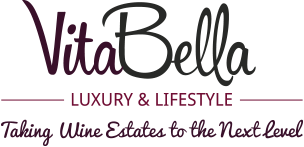Many wine estates today are asking us what they should do. It is now the time to think about the issue as the launch date has been announced. I collaborate with Guillaume Marchais on complicated and sometimes sensitive projects for some of the great wine brands, and I wanted to ask him three questions to throw some expert light on the subject. Previous issues of the Vini Ma®k newsletter edited by Marchais & Associés had kept us up to date on the various delays in the availability of these names; their management has finally been assigned to DONUTS. These names will rapidly enter into use and the general calendar is as follows: first there will be a priority registration period known as the “Sunrise period”, opening on the 17th November 2015 up to the 16th January 2016, which is open to owners of brands registered with the Trademark Clearinghouse (TMCH). So, what should brands do? Guillaume Marchais and I are in total agreement: registration with the “TMCH” is a must.
Châteaux, domains, wine brands… Should they be interested in the topic today?
Guillaume Marchais: “It is a major topic, as demonstrated by the commotion before these names were even launched. Over the past several years we have seen more than 1,000 new extensions launched by ICANN (Internet Corporation for Assigned Names and Numbers), with the aim of renewing interest in domain name registration. Whilst some extensions may seem totally worthless, the much publicized (.vin) and (.wine) aroused immediate interest, and an equal measure of suspicion and even hostility in the wine production sector, particularly in France and elsewhere in Europe. Indeed, no mechanisms to protect appellations of origin or geographical indications were envisaged, for which massive, fraudulent registration by businesses or individuals with no legitimacy to do so could justifiably be feared. An offensive was led principally by the CNAOC, joined by the French Secretary of State for Digital Affairs, Axelle LEMAIRE. As the protest movement grew, numerous wine industry lobbies around the world including more than 2,000 American wineries rallied around the “Protect wine place and origin” project. At the same time, the American company DONUTS INC. had successfully bid at auction for the right to be the registrar of the domain names (.vin) and (.wine) on behalf of ICANN, which means that this company has been authorized to manage and attribute the (.vin) and (.wine) extensions. One of the major stumbling blocks was getting DONUTS to sign an agreement on methods of protection for the appellations and geographical indications, protection that was widely called for. This agreement now having been reached, the (.vin) and (.wine) extensions have officially been assigned to DONUTS, to the great satisfaction of the wine world. There is now no longer any reason for lack of confidence in the names (.vin) and (.wine) because of the protection mechanisms that were obtained after this prolonged struggle. There also exists a list of “reserved names” corresponding to a great number of appellations, and which are therefore inviolable”.
So are these domain names just gadgets, or not?
GM: “I take the view that, no, these extensions are not just simple gadgets, as was the case with some of the names created by ICANN just to generate revenues. Here something more is genuinely at stake, and I think that we’ll see the number of websites ending in (.vin) and above all (.wine) flourish. It is therefore for defensive reasons, to avoid new cases of cybersquatting, and consequently to save money, that reserving these names is a wise idea, in my view. So, you have to play the game and go through the process of registering with the TMCH; priority reservation which I consider necessary for all the great names in wine throughout the world. Just a few words about this strange acronym TMCH, which stands for Trademark Clearinghouse. It is a storehouse of names, established jointly by DELOITTE, for the authentication and validation of brand ownership, and IBM, for the technical side, which ICANN has entrusted with verifying the rights to a number of new extensions of which (.vin) and (.wine) form part, thus allowing their priority reservation. The idea is therefore to create a priority reservation period (the “Sunrise period”) during which wine brand owners can reserve domain names ending in (.vin) and (.wine), without fear of cybersquatters.”
So what action should we take?
GM: “The deadlines have been brought forward and in fact things are already happening. Two main periods have been established, the most important being the “Sunrise period” which just began on the 17th November and runs until the 16th January 2016. It consists of a validation procedure allowing registered brand and trademark owners to obtain a digital certificate, provided that they can prove registration of their brand(s) as well as effective use of the registered brand(s). Following this validation by the TMCH, it will be possible to reserve domain names using (.vin) and (.wine), without any fear of cybersquatting. Some points worthy of note: 1) Only registered brands can be approved by the TMCH, not recently filed names that are not yet registered 2) The extensions (.vin) and (.wine) subsequently attributed must be identical to the brands, without any variation. For example, the owners of the brand CHATEAU DURAND may only reserve chateaudurand.vin or chateau-durand.vin, without adding or removing any elements 3) Similarly, in practice it is important to note that if a Chateau or a Maison is the owner of a brand which includes several parts, they may not reserve only one of these elements, but must file for a new brand for this single element.”
Working on the challenges that brands face internationally, our expertise in Communication and Marketing at VitaBella leads us to collaborate on a regular basis with Marchais & Associés. Today we help wine brands to better understand and analyse strategic issues, and this extension of domain names is a subject for serious consideration. Why? Because once the brand has been approved by the TMCH, the domain names may be reserved in priority. At the end of this “Sunrise period”, as from the 27th January 2016, reservation will be open to anyone without any justification required on a “first come, first served” basis. What this means is that, if a wine estate has not registered their brand with the TMCH, anyone else will be able to reserve a domain name ending in (.vin) et (.wine) corresponding to their name “Chateau, Maison or estate” for between 1 and 10 years. The vineyard owners then may have to suffer the anguish of fraudulent reservations and the vagaries and additional costs of legal proceedings to try and recover these names, hence the interest in going through the TMCH as a preventive measure and a less expensive route. The other advantage of the TMCH that should also be highlighted is that it will act as a monitoring tool which can signal the filing of names that are identical to a declared brand but which have not been reserved, and thus react by initiating a Uniform Rapid Suspension, or URS procedure; which is an extrajudicial and extremely rapid process specifically designed for this situation. In conclusion, reserve your brands straight away with the TMCH to ensure that you are protected from fraudulent reservations.
About Guillaume Marchais: Barrister, and founder of the MARCHAIS & Associés firm (specialists in Intellectual Property Law) Guillaume MARCHAIS is more particularly a specialist in trademark law for wine domains and senior lecturer for the Master in Vine and Wine Law at the University of Suze-la-Rousse.
About Guillaume Jourdan: As a regular consultant (see his next project) to businesses, Guillaume Jourdan began his career in the world of luxury cosmetics. This was followed by a period as financial communication strategy advisor to publicly listed companies. As part of the Bertelsmann group he was a board member and World Communications Director of Lycos before creating VitaBella Luxury Wine. Since 2004 he has advised more than 200 wine brands on their Marketing & Communication strategy. Guillaume is the holder of a Business School degree and an MBA.



